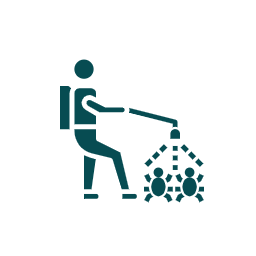Rodent infestations in strata-titled properties are more than just a nuisance — they represent a serious pest control problem that can affect both strata properties and tenants, as well as property managers. Pest issues can result in property damage, legal problems and unhappy tenants for real estate and strata professionals. That is why the usual pest control simply won’t do—it is not optional; it is essential.
In this piece, we’ll be giving you a look at how Pest2Kill, a top Sydney pest control company, serves their local strata properties in keeping them pest-free. So whether it’s knowing what pests are common in strata buildings or understanding whose responsibility it is to control a pest — this guide is full of tips for body corporates, landlords, property managers and tenants.
Who Is Responsible for Pest Control in Stratum Properties
One of the most frequent queries in strata is, who is really responsible for pest control? The response will differ according to a number of factors — including the kind of pest infestation, the part of the building impacted, and the obligations outlined in the strata scheme’s agreement.
As a general principle, pest control in common areas, including hallways, foyers, roof cavities and shared areas like gardens or car parks, is the responsibility of the body corporate. Tenants or landlords, however, may be left to deal with pests on a unit-by-unit basis —particularly if the issue is the result of unclean conditions or bad hygiene.
However, that middle ground can become swampy quickly when there is no regular pest control plan in place. This is why strata managers often hire professional companies, like Pest2Kill, to manage pest control and ensure clear responsibilities for all parties involved.
The Most Common Pests Found in Strata Buildings
Strata buildings are particularly vulnerable to certain types of pest infestations due to the high density of people, food sources, and communal areas. Some of the common pests found in Sydney strata include:
- Rodents (especially roof rats and mice)
- Cockroaches, including German cockroaches
- Ants, particularly in kitchen and laundry areas
- Spiders, which thrive in secluded corners and under stairwells
- Termites, which can cause serious structural damage
Rodents, in particular, are known to exploit entry points in walls, roof voids, and drainage systems, making them hard to eradicate without professional help. They pose a major health and safety risk, contaminating surfaces, chewing through wires, and even sparking fires.
These pests found in strata properties are more than a nuisance—they’re a serious threat to the living environment, tenant satisfaction, and property value.
Why Regular Pest Control in Strata Is Crucial for Health, Safety, and Compliance
When it comes to strata pest control, prevention is far more cost-effective than cure. A one-off treatment may offer temporary relief, but regular pest control measures are the only way to maintain a consistently pest-free environment.
Unchecked pest infestations can quickly spread through walls, ceiling voids, and pipework, affecting multiple units in a short span of time. This not only disrupts daily life for tenants but can also lead to expensive damage and even legal claims if it’s shown that the property manager or body corporate failed to address pest issues in a timely manner.
In some cases, the landlord is responsible if the infestation renders the unit uninhabitable or if pest presence existed prior to tenant occupation. Regardless of who may be responsible, a proactive pest plan helps prevent pests, protects your investment, and ensures full compliance with NSW tenancy and property laws.

Pest2Kill’s Integrated Pest Management for Strata Properties
At Pest2Kill, we use an integrated pest management (IPM) approach, combining proactive measures, preventative techniques, and tailored pest treatments to suit the unique needs of each strata property.
We begin with a comprehensive pest inspection to identify entry points, signs of pest activity, and the specific pest pressures affecting your site. From there, our technicians create a customised pest management plan that may include
- Baiting systems for rodents
- Surface sprays for cockroach and ant infestations
- Dusting in roof cavities and wall voids
- Sealing off entry points to prevent re-infestation
- Regular inspections and treatments to monitor activity
This effective pest control strategy helps prevent outbreaks before they occur and ensures the strata building remains free from pests long-term. It also gives property managers and body corporates the peace of mind that their building is being professionally maintained.
The Importance of Regular Inspections and Treatments in Strata Management
Regular pest inspections and scheduled pest control services are essential in stratum settings. Whether it’s a quarterly visit or a biannual checkup, these inspections and treatments catch potential pest issues before they escalate.
Common areas such as rubbish bins, basement car parks, communal kitchens, and laundry rooms are often the first to attract pests—especially if there’s a lack of cleanliness. Rodents, in particular, will exploit food scraps, pet food, and cluttered storage spaces. Without regular pest attention, these spaces become breeding grounds for infestation.
Pest2Kill helps strata managers maintain a clean, safe and pest-resistant environment by offering scheduled pest control programmes backed by detailed reporting. These records are invaluable for compliance and communication between property managers, tenants, and body corporates.
Educating Tenants and Property Owners on Pest Prevention
An often-overlooked aspect of pest control for strata is educating those who live and work in the building. Tenants and property owners need to understand how their actions contribute to the overall pest landscape of a stratum.
Simple steps like keeping food sealed, taking out rubbish regularly, reporting leaks or cracks, and notifying management of signs of pests early can make a big difference. If everyone in the building adopts proactive measures to prevent infestation, the risk drops significantly.
At Pest2Kill, we work with property managers to provide practical pest prevention advice that can be shared during new lease signings or tenant onboarding. This collaborative effort ensures the building stays pest-free between professional treatments.
Pest2Kill’s Expertise in Real Estate and Strata Pest Control
As a leading pest control company servicing over 7,000 Sydney clients, Pest2Kill understands the specific pest challenges faced by strata-managed properties. Our experienced technicians are trained in effective pest management practices tailored for:
- Real estate and strata agencies
- Large strata buildings and multi-residential complexes
- Property managers overseeing multiple units
- Body corporates with legal pest obligations
Our approach is not just about solving a pest problem once—it’s about long-term protection, compliance, and preserving property value. Whether it’s a rodent infestation in a carpark or cockroach activity in shared laundries, we have the tools and know-how to solve it fast—and keep it from coming back.
Conclusion: Protect Your Strata Property with Pest2Kill
Whether you’re a landlord, tenant, property manager, or member of a body corporate, the health of your strata building depends on professional, consistent, and strategic pest control. Left unchecked, pest infestations can lead to serious health and safety risks, disputes, and costly repairs.
Pest2Kill offers reliable, award-winning pest control for strata properties across Sydney. From rodent removal to ongoing pest management, we provide peace of mind, protect your property, and ensure every stratum stays safe, clean, and compliant.
Get in touch with Pest2Kill today to organise a customised pest control programme for your strata property—and let us help you keep your tenants happy, your property protected, and your reputation spotless.
FAQS
What should strata managers do when a pest infestation spreads across multiple units?
When an infestation affects more than one individual unit, strata managers must act promptly. Because these issues often extend into common property areas like ceiling voids or shared walls, a coordinated response is essential. Pest control for strata buildings requires a professional approach that includes identifying the source, notifying residents, and organising expert pest control services. Acting early helps avoid costly repairs and ensures you’re responsible for maintaining a safe, habitable environment.
Why is pest control crucial in shared residential buildings?
Pest control is crucial in strata and apartment complexes because pest infestations can cause serious health and safety risks to all occupants. Without proactive pest control, issues can quickly spread through ventilation systems, plumbing, or shared bins. Keeping up with pest control for real estate properties that house multiple tenants ensures everyone enjoys a clean, safe, and pest-free home. It also protects the value of your investment and strengthens your reputation as a responsible property owner or manager.
How do pest control services differ between individual units and common property?
Pest control services for an individual unit are typically the responsibility of the occupant or owner, especially if the issue stems from indoor habits or a failure to keep the property clean. However, when pests are traced to common property like garbage rooms or shared storage areas, the body corporate is responsible. Understanding these distinctions is key for strata managers who must coordinate both individual pest control and shared control measures across the entire building.
What control measures can prevent infestations in strata-managed properties?
Effective control measures in strata-managed buildings include sealing cracks and gaps to seal entry points, installing door sweeps, maintaining clean bin areas, and ensuring residents keep the property clean. These proactive pest control strategies help stop rodents, cockroaches, and other pests before they become a problem. Working with a licenced technician to design a regular treatment schedule is the best way to protect properties, including residential units, foyers, and basement car parks.
Why should strata managers prioritise regular pest control?
For strata managers, regular pest control is crucial to maintain health standards, meet tenant expectations, and avoid potential disputes. Keeping your property free from pests isn’t just about comfort—it’s about compliance and duty of care. Scheduled inspections and treatments also help identify risks early and provide documentation that proves the building is being responsible for maintaining a safe and healthy living space for all.














